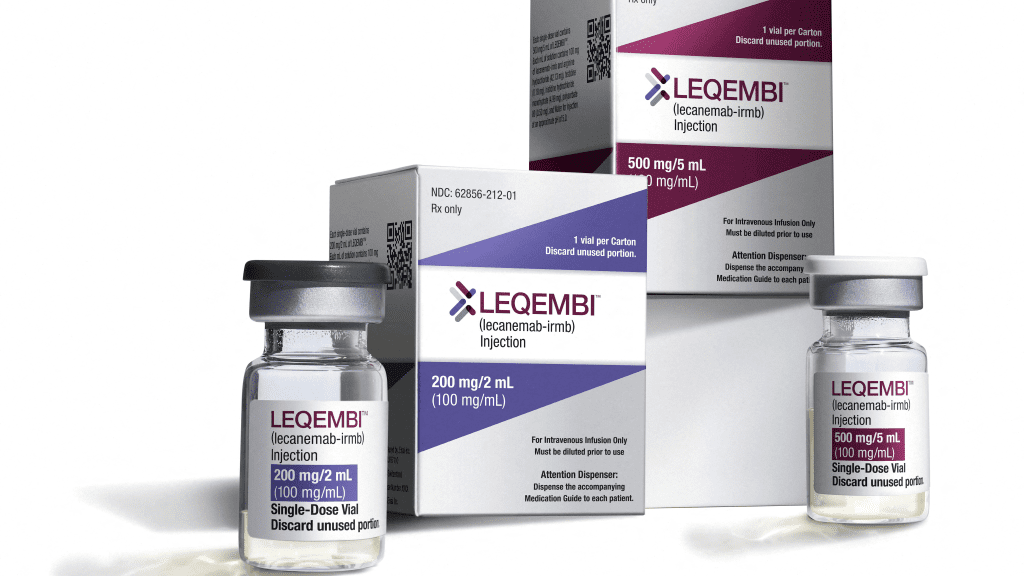 handout image obtained by Reuters on January 20, 2023.
handout image obtained by Reuters on January 20, 2023. The US FDA has granted full approval to Leqembi, a breakthrough Alzheimer’s drug developed by Eisai and Biogen.
- The drug has been proven to slow the progression of the disease, offering hope to millions of patients and their families.
- The FDA’s approval has prompted a policy change by the CMS, expanding Medicare coverage for Leqembi to patients beyond clinical trial participants.
- The cost of Leqembi and its potential impact on healthcare spending, particularly Medicare’s budget, have raised concerns.
On July 6, the US Food and Drug Administration (FDA) granted full approval to Leqembi, the first medication proven to slow the progression of Alzheimer’s disease. Developed by Eisai and Biogen, Leqembi received accelerated approval in January based on its ability to clear amyloid plaque buildups associated with the disease. The recent full approval confirms its clinical benefit in treating Alzheimer’s.
In an 18-month clinical trial involving patients with mild cognitive impairment or mild dementia, Leqembi demonstrated a 27% reduction in cognitive decline and function. While it does not provide a cure, the drug offers patients more time to maintain their independence and engage in activities they love.
Teresa Buracchio, acting director of the Office of Neuroscience in the FDA’s Center for Drug Evaluation and Research, emphasized the significance of this milestone, stating, “Today’s action is the first verification that a drug targeting the underlying disease process of Alzheimer’s disease has shown clinical benefit in this devastating disease.”
However, Leqembi is not without risks. Approximately 13% of trial participants experienced side effects such as brain swelling or bleeding, with higher risks for certain groups based on genetics or concurrent use of blood-thinning medications. The FDA has issued a boxed warning to ensure patients and caregivers are aware of these potential risks. Regular brain imaging and monitoring are necessary during treatment.
The FDA’s approval of Leqembi has triggered a significant policy change by the Centers for Medicare and Medicaid Services (CMS). Previously, coverage was limited to patients enrolled in clinical trials. However, upon full FDA approval, the CMS announced in June that it would expand Medicare coverage to include the medication. Patients will likely face out-of-pocket costs, with traditional Medicare covering 80% of the approved amount after the Part B deductible is met. Medicare Advantage and supplemental plan coverage will vary.
Patient advocacy groups and research organizations have applauded the c, recognizing the potential benefits of Leqembi for individuals in the early stages of Alzheimer’s. Dr. Joanne Pike, president and CEO of the Alzheimer’s Association, emphasized in a statement on Thursday that the treatment provides individuals with more time to maintain their independence and engage in activities they love, including recognizing their loved ones. “This treatment, while not a cure, can give people in the early stages of Alzheimer’s more time to maintain their independence and do the things they love,”
However, experts have raised concerns about the drug’s modest impact on cognitive decline and its associated risks. The cost of Leqembi, $26,500 per year, has also raised concerns about healthcare spending and its potential impact on Medicare’s budget.
Despite these challenges, Leqembi represents a significant advancement in Alzheimer’s treatment and marks the beginning of a new era. It paves the way for the development of more effective therapies in the future. The CMS will require physicians to participate in a data registry to monitor the drug’s real-world performance and gather evidence of its effectiveness.
While there are hurdles to overcome, Leqembi offers hope to individuals with Alzheimer’s and their families, providing them with additional time and improving their quality of life.
Inside Telecom provides you with an extensive list of content covering all aspects of the Tech industry. Keep an eye on our Medtech section to stay informed and updated with our daily articles.